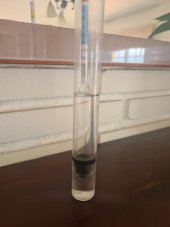I think I may have permanently ruined my Lead Acid batteries due to my own neglect...
I have 2x 245Ah Lead Acid which I've had constant problems with for months now, they just wont hold a charge. I've had them for just over a year now.
I've just tested the gravity with a hydrometer and it was so high the hydrometer wouldn't show a reading. I added distilled water (About 50% of what I took out) and I got it down to 1.200 so the batteries definitely need water.
My question is... have i ruined these batteries? Or would some distilled water to the correct gravity and a good charge do anything?
Thanks
Will.
I have 2x 245Ah Lead Acid which I've had constant problems with for months now, they just wont hold a charge. I've had them for just over a year now.
I've just tested the gravity with a hydrometer and it was so high the hydrometer wouldn't show a reading. I added distilled water (About 50% of what I took out) and I got it down to 1.200 so the batteries definitely need water.
My question is... have i ruined these batteries? Or would some distilled water to the correct gravity and a good charge do anything?
Thanks
Will.




